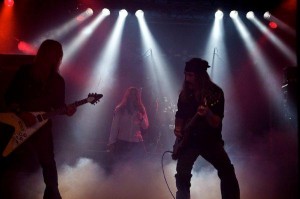By Keith Carman
“Sometimes it is just frustrating to realize we’re living in a third world country when it concerns music,” grunts The Secret guitarist Mike Bertoldini. “To be honest, everything music related totally sucks here.”
To the uninitiated, seven year-old extreme metal brigade The Secret is one of Italy’s few explosive and heavily revered acts. Yet despite an intensifying profile, much of that attention fails to come from the land of olive oil and wine.
In fact, The Secret’s notoriety is everywhere but. Thanks to underground metal’s word-of-mouth and music-trading communities, it would seem as if the rest of the global metal contingent is keen to something Italians can’t even fathom.
Moreover, as evidenced on the band’s third full-length Solve Et Coagula (Southern Lord Records), it’s a notoriety that is entirely earned. The Secret’s abrasive, caustic and fiery amalgam of extreme music sub-genres has a mind, taste and impact all its own, ensuring Solve Et Coagula is an album that finds Converge-influenced hyperactive passion uniting with obliteratingly heavy detuned riffs, demonic girth and attitude clearly culled from black metal’s most tormenting heyday. Essentially, Solve Et Coagula is as imposing and acerbic as it is enthrallingly original.
Strange then, that only their homeland seems ignorant to The Secret’s brilliance. As Bertoldini relates though, because its populace refuse to embrace anything but pre-packaged music, the band (completed by vocalist Marco Coslovich, bassist Enrico Uliana and drummer Tommaso Corte) has been forced into a sense of patriotic discontent; a disgruntled state motivated by seeing foreign record labels such as Canada’s Goodfellow Records—who issued debut Luce circa 2004 and sophomore release Disintoxication a few years later —and Americans Southern Lord support their cause.
“Italy is a weird country and it’s definitely not famous for its musical tradition,” he continues. “Even if it sounds totally nonsense, most of the times Italian media needs to have a North American ‘approval’ before giving bands a chance. We’ve been never been contacted by any Italian label. Anyway, I’m not complaining, we’re actually happy to work with North American labels.”
Channelling that frustration into a truly inimitable sound one might say harkens back to the formative years of Toronto-based doomsday prophets Cursed but deserves reverence as its own autonomous force, The Secret are onto something fresh. Bertoldini humbly shuns the notion of sprouting new aural strains, however.
“I really don’t know (if we’re prompting a new vein in hardcore/metal) and most importantly, I don’t care,” he states with all sincerity. “What we want to do with this band is play the music we love, whatever it is. I think that it’s not our role to predict what place we’re gonna have in the contemporary music scene. We care about doing our own thing and being a honest band; that’s it. The concept of ‘new’ is totally relative in this moment and the only thing I can say is that we want to take distance from a big part of what heavy music has become lately.”
At that, he notes how The Secret don’t really put much thought into anything other than catharsis, the driving sentiment behind both Solve Et Coagula‘s bleak imagery and a unified lack of interest in being a part of what they see as a failing scene.
“I don’t like how a part of heavy metal and hardcore music has become a joke. I don’t want to sound overly pretentious but I think it’s pretty sad to see how many younger bands have totally lost touch with what hardcore and metal was meant to be at the beginning. I don’t really care about listening to 250 BPM copy/pasted double bass, 300 breakdowns per song, auto tune, ’emotionally-driven’ choruses and a 16 year old kid screaming about shooting his 15 year old ex-girlfriend in his imaginary world.”
“Most of our lyrics are a reflection of the times and the country we’re living in,” Bertoldini concludes, explaining the motivation behind Solve Et Coagula, The Secret and their disdain for placement amongst the new wave of hardcore acts. “I think that the main lyrical concept of the record is the loss of faith in pretty much everything. Politics, religion, media. Playing is a very cathartic experience, so it’s something we’re doing mostly for ourselves. The band is pretty much an outlet for our negative sides.”


